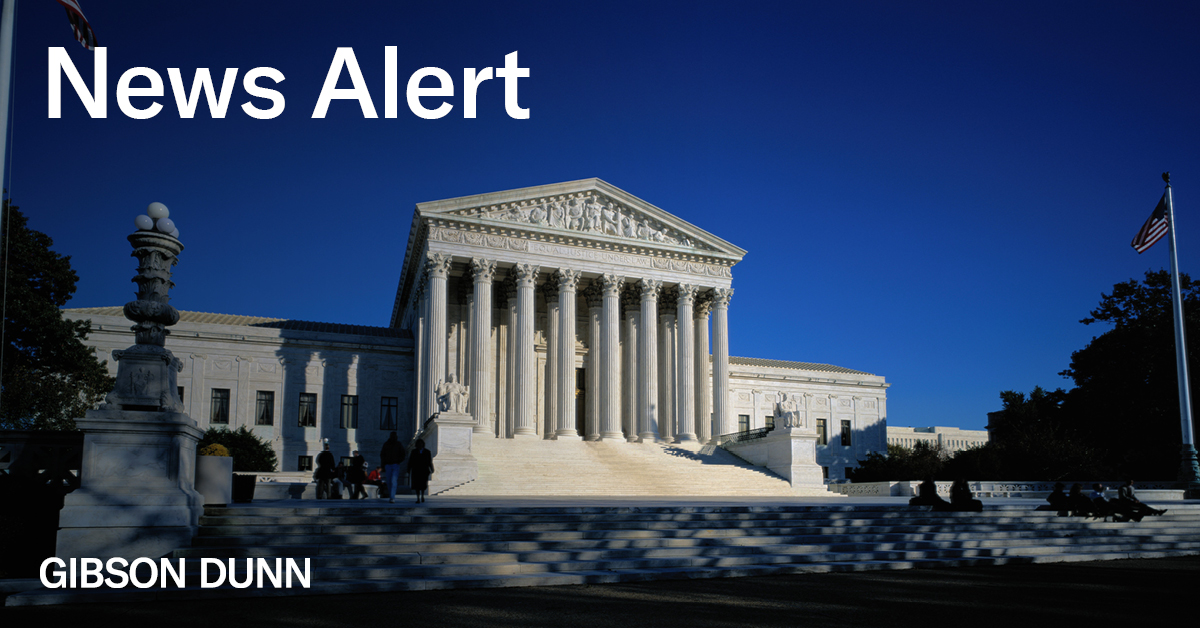June 28, 2024
Loper Bright Enterprises v. Raimondo, No. 22-451
Relentless, Inc. v. Department of Commerce, No. 22-1219 – Decided June 28, 2024
Today, the Supreme Court overruled Chevron v. Natural Resources Defense Council, a landmark decision that had required courts to defer to agencies’ reasonable interpretations of ambiguous statutory terms.
“Chevron is overruled. Courts must exercise their independent judgment in deciding whether an agency has acted within its statutory authority, as the APA requires.”
Chief Justice Roberts, writing for the Court
Background:
The Supreme Court’s decision in Chevron v. Natural Resources Defense Council, 467 U.S. 837 (1984), instructed courts to apply a two-step framework when reviewing administrative agencies’ interpretations of statutes that they administer. At step one, courts determined whether the statute had an unambiguous meaning using the traditional tools of statutory construction. If not, then courts proceeded to step two, at which they deferred to the agency’s interpretation as long as it was reasonable. This meant that an agency’s reading of the law could control even if it was not the view that a court would otherwise adopt using its independent judgment (and even if the agency’s view had changed over time).
Loper Bright Enterprises and Relentless, Inc. are small businesses engaged in herring fishing off the Atlantic coast. They brought two lawsuits challenging a rule promulgated by the Department of Commerce that required them to pay for government-approved fishing monitors, which can reduce fishers’ returns by up to 20%. The challengers argued that this rule was unauthorized by the governing statute, which did not expressly say who should pay for these monitors. The district courts in both cases granted summary judgment to the Department, and the D.C. Circuit and First Circuit affirmed. Applying Chevron, these courts both held that the agency had reasonably interpreted the statute.
Issue:
Whether the Court should overrule or clarify the Chevron doctrine.
Court’s Holding:
Chevron is overruled. Judicial deference to administrative agencies’ statutory interpretation is contrary to the Administrative Procedure Act (“APA”) and traditional principles of judicial review. Judges must independently interpret statutes without deference to an agency’s reading of the law.
What It Means:
- Overruling Chevron will make it more difficult for government agencies to win cases turning on statutory-interpretation questions. Today’s decision continues a trend of Supreme Court decisions reining in administrative agency action, including recent cases curbing the Securities and Exchange Commission’s power to bring enforcement actions in administrative tribunals rather than federal courts (SEC v. Jarkesy) and granting a stay of the Environmental Protection Agency’s “Good Neighbor” emissions-regulation plan for failing to comply with the APA’s requirement of reasoned decisionmaking (Ohio v. EPA). Altogether, this case law signals the Justices’ skepticism of expansive claims of regulatory power by federal agencies, and today’s action is a major resetting of the balance of power between courts and agencies, as well as between agencies and challengers of agency action.
- Notably, the Court rested its decision on the plain language of the APA, which provides that a court reviewing agency action “shall decide all relevant questions of law” and “interpret constitutional and statutory provisions.” 5 U.S.C. § 706. Justice Thomas wrote a separate concurrence to explain his view that Chevron also violates the Constitution’s separation of powers by abdicating judges’ duty to exercise independent judgment and impermissibly conferring that judicial power on the Executive Branch.
- The effects of Chevron’s demise will likely be most dramatic in the lower federal courts, some of which have continued to apply Chevron in recent years even as the Supreme Court has rarely invoked the doctrine over the past decade. Today’s decision instructs these circuit and district judges to change their practices and abandon deference. Instead, they “must exercise their independent judgment in deciding whether an agency has acted within its statutory authority.”
- Going forward, agencies’ interpretation of statutes will still be entitled to a lesser degree of “respect” under Skidmore v. Swift & Co., insofar as the agencies’ views are persuasive. This may depend on factors such as whether the agency adopted the interpretation close in time to the statute’s enactment and how consistently the agency has adhered to that interpretation since.
- Today’s decision does not necessarily unsettle prior cases relying on Chevron to interpret statutes. The Court stated that a prior case’s reliance on Chevron to conclude that an agency’s action was lawful is not, standing alone, justification to overrule it.
- Even after today’s decision, agencies will likely continue to issue regulations largely as before the overruling of Chevron, particularly in certain areas, though the scope of such regulations may change. For example, taxpayers will continue to seek rules regarding how to report routine business transactions and will want to participate in the rulemaking process through the notice and comment procedure. While today’s decision will have a significant impact on the litigation landscape regarding such tax and other regulations, many of those regulations faced strong judicial headwinds when challenged even under Chevron.
Gibson Dunn represented the Chamber of Commerce of the United States of America as Amicus Supporting Petitioners in Loper Bright.
The Court’s opinion is available here.
Gibson Dunn’s lawyers are available to assist in addressing any questions you may have regarding developments at the U.S. Supreme Court. Please feel free to contact the following practice group leaders:
Appellate and Constitutional Law Practice
Related Practice: Administrative Law and Regulatory Practice
This alert was prepared by associates Max E. Schulman and Nicholas B. Venable.
© 2024 Gibson, Dunn & Crutcher LLP. All rights reserved. For contact and other information, please visit us at www.gibsondunn.com.
Attorney Advertising: These materials were prepared for general informational purposes only based on information available at the time of publication and are not intended as, do not constitute, and should not be relied upon as, legal advice or a legal opinion on any specific facts or circumstances. Gibson Dunn (and its affiliates, attorneys, and employees) shall not have any liability in connection with any use of these materials. The sharing of these materials does not establish an attorney-client relationship with the recipient and should not be relied upon as an alternative for advice from qualified counsel. Please note that facts and circumstances may vary, and prior results do not guarantee a similar outcome.





